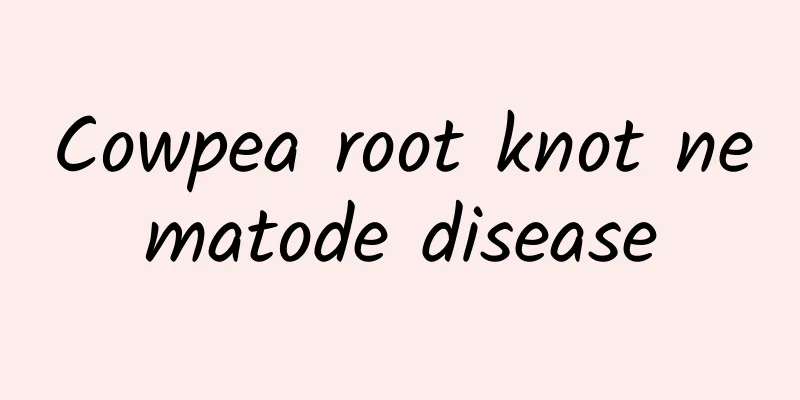Cowpea root knot nematode disease

|
How can we prevent and control cowpea root knot nematode disease when we grow cowpeas so that cowpeas can grow better? Here are some specific methods: Cowpea SymptomsIt only harms the roots, and lateral roots and branch roots are easily affected. The diseased roots form small tumors of varying sizes. When they are dissected, many white pear-shaped female nematodes can be seen, causing the above-ground part to grow weakly, the plants to be short and light in color, and to produce no pods or poor pods. The plants often wilt around noon when the weather is dry or there is a lack of water in the soil. The above symptoms can be seen when the diseased roots are pulled out. Cowpea pathogenMeloidogyne incognita Chitwood, called southern root-knot nematode, and M.jaVanica Treub, called Javan root-knot nematode, are parasitic plant nematodes. Southern root-knot nematodes have different sexes. Larvae are slender and worm-like. Male adults are linear, with a slightly rounded tail, colorless and transparent, and 1.0-1.5×0.03-0.04 (mm) in size. Female adults are pear-shaped, and each female can lay 300-800 eggs, which are mostly buried in the host tissue, and 0.44-1.59×0.26-0.81 (mm) in size. The female Javan root-knot nematode is pear-shaped, with an average length of 1mm and a width of 0.5-0.75 (mm). It contains hundreds of eggs and lives parasitically in the host. The male is slender, cylindrical, 1-1.5 (mm) long and 0.03-0.04 (mm) wide. It mainly moves and lives in the soil. The eggs are oval, 0.08×0.03 (mm) in size, and develop in the mother or egg capsule. After hatching, they leave the host and easily fall into the soil. The larvae are not male or female, and they begin to differentiate into male and female after invading the host. The Javan root-knot nematode has a special perineal pattern, which has a clear notch at the lateral line, separating the line between the back and the abdomen. This line extends from the perineum to the neck along the female body, which is an important feature to distinguish it from the southern root-knot nematode. Disease characteristics of cowpeaThe pathogenic nematodes overwinter in the soil as eggs. The larvae hatched from the eggs are called second-instar infective larvae. They spread through rainwater and irrigation water, invading from the young root tips until they develop into adults and become resident endoparasitic nematodes. While the mouth needle pierces the host to feed, it injects secretions to stimulate the proliferation and enlargement of host cells, forming nodules. The disease is usually more severe in sandy loam (the soil is neither too dry nor too wet) or in continuous cropping fields. Cowpea control methods(1) Agricultural prevention and control. ① Crop rotation should be implemented in seriously diseased areas and seriously diseased fields, preferably water-land rotation. ② After harvest, deep plow the fields and flood them with water for 2-3 weeks to kill some nematodes. (2) Chemical control. ① Soil treatment before sowing: Apply 75kg/hm2 of 10% preparation of Limanku (chlorpyrifos) or chloropicrin (100g/667m2, suitable for greenhouse use) by broadcasting or applying in furrows. ② Deal with the diseased plants in time. Use 3% chlorpyrifos granules to make poisonous soil holes and apply them to the root zone of the diseased plants, 8-9g of granules per square meter, or sprinkle 50% chlorpyrifos 1000-1500 times liquid, which also has a certain effect. |
<<: Symptoms and prevention methods of cowpea root rot
>>: Homemade eggplant recipe tutorial
Recommend
Estee Lauder eye cream shelf life
I believe many women have bought Estee Lauder eye...
How is the Vietnam Photographic Artists Association? Reviews and website information of the Vietnam Photographic Artists Association
What is the website of Vietnam Association of Phot...
Plants that are not suitable for growing at home
In order to beautify the indoor environment and p...
How is Scotiabank? Scotiabank reviews and website information
What is Scotiabank? Scotiabank is Canada's mos...
What is Wheelock Properties like? Wheelock Properties reviews and website information
What is Wheelock Properties? Wheelock Properties (...
How is the Chinese Home for Chinese Students in Finland? Reviews and website information of the Chinese Home for Chinese Students in Finland
What is the Home of Chinese and Chinese Students i...
The efficacy and function of longevity flower
Kalanchoe is a beautiful ornamental plant. It is ...
What is the Aga Khan University like? Aga Khan University reviews and website information
What is the website of Aga Khan University? Aga Kh...
How to eat whole grain powder? The effects and hazards of whole grain powder
There are many types of whole grains. Corn, soybe...
What is O'Reilly Publishing? O'Reilly Publishing reviews and website information
What is O'Reilly Publishing? O'Reilly Medi...
Ramie porridge
How much do you know about some common knowledge ...
How is Grass Valley? Reviews and website information
What is the website of Grass Valley? Grass Valley ...
How to eat mulberry sauce best? How to eat mulberry sauce
Mulberry sauce is a purple-black pickled radish w...
What happens if you eat too much mango? Taboos for women to eat mango
Mango is a delicious and juicy tropical fruit. Wi...
Garlic-fried eggplant
Every Chinese New Year, I often cook garlic-fried...









